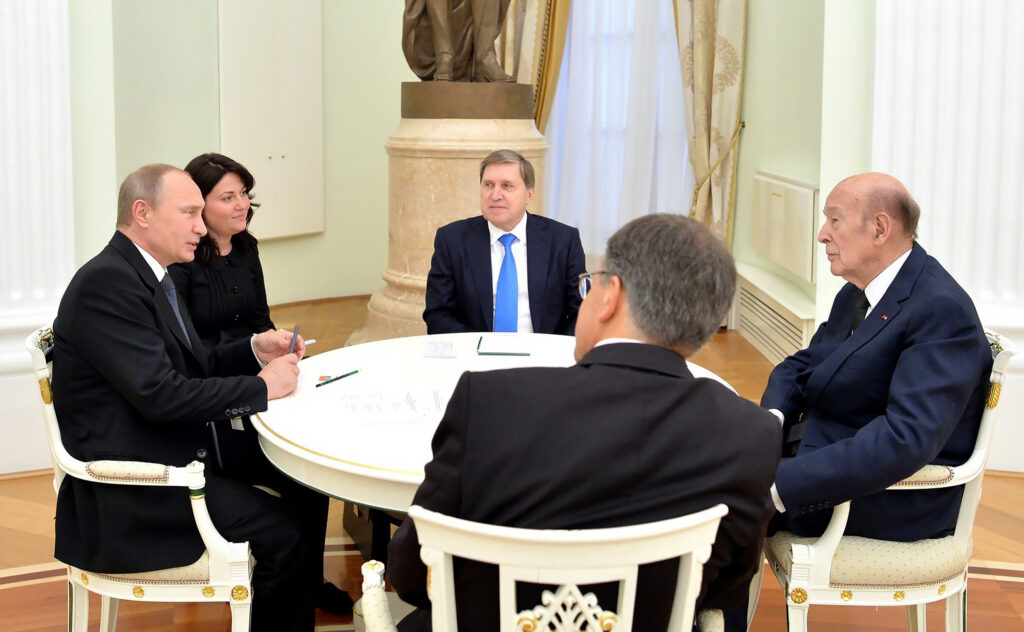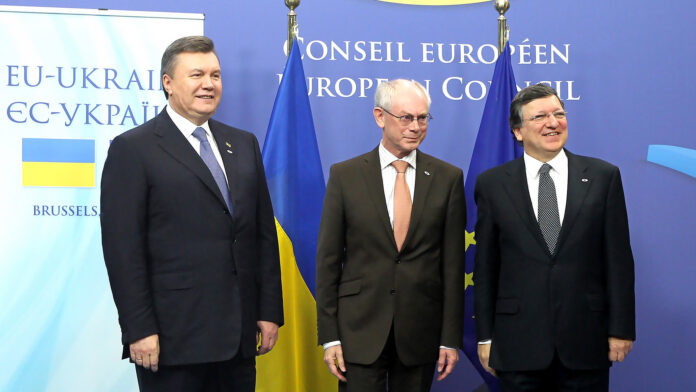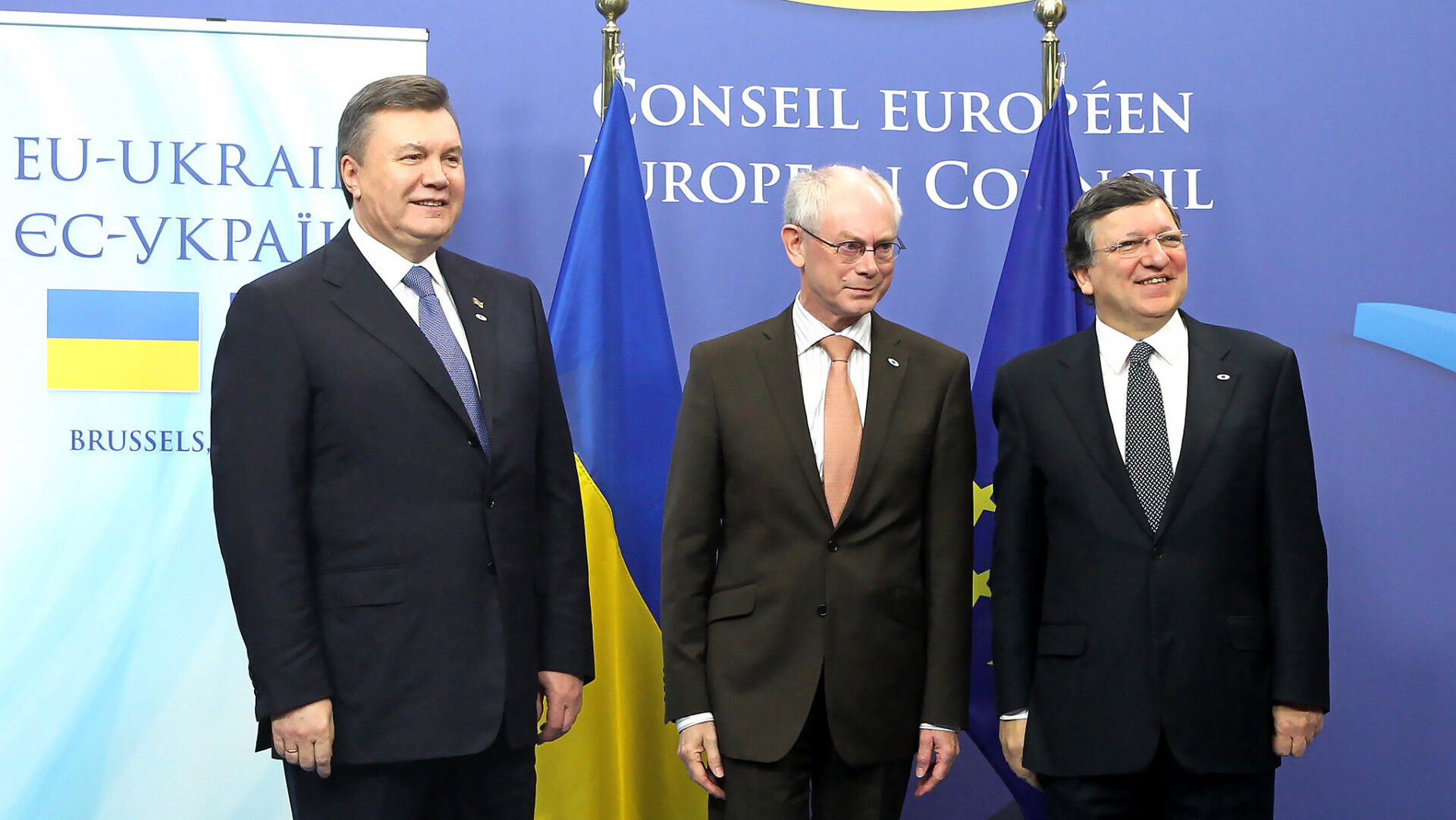The Ukrainian intellectual returns to the perception of Ukraine by Westerners which, for at least the last two centuries, has been influenced by Russian “imperial knowledge”, this narrative developed by the Russian Empire to legitimize its hegemony over the ‘Ukraine. Europe’s long non-recognition of Ukraine’s Europeanness has strengthened Russian ambitions and cost tens of thousands of Ukrainian lives and massive destruction.
In early March 2022, as Russian troops were approaching the outskirts of Kyiv and the international media were focused on Ukrainian frontlines, the informal meeting of EU leaders at Versailles did not attract much attention among journalists, nor was the document they adopted carefully scrutinized. The insipid language of the Versailles declaration did not differ much from past EU statements about Ukraine, reduced essentially to non-binding “acknowledgement” of Ukraine’s “European aspirations and European choice” and vague promises to “further strengthen our bonds and deepen our partnership to support Ukraine in pursuing its European path.” This time, however, a short phrase was added to the ritualistic curtseys to mark a real breakthrough in long and ambiguous EU-Ukraine relations. Seemingly simple and ordinary, it would have been unfathomable just a few weeks earlier. “Ukraine,” the document stated, “belongs to our European family.”
This might be too obvious, even trivial, unless we remember that throughout the past decades the official language of the EU had been watchfully cleansed of any wording that may have hinted at Ukraine’s Europeanness. Because such a hint, EU officials believed, may have implied, at least theoretically, Ukraine’s eligibility for membership. And this was a real nightmare for the EU, as a French diplomat once told me, comparable only to the possible accession of Turkey. This is why not a single EU document has ever referred to Ukraine as to a “European state,” but employed instead tricky euphemisms like a “partner country,” or “neighboring country,” and cautiously pushed it onto mental maps at a safe distance, within a nebulous space called “western NIS,” “western CIS,” or “western Eurasia.” This is why all Ukraine’s overtures vis-à-vis the EU were met with polite “acknowledgement” of its European aspirations – a frustrating catch-phrase that meant something like “give me your phone number, I’ll call you later.”
The real meaning of this politeness was revealed in less formal statements by many EU officials. Suffice to mention Romano Prodi’s notorious remark that Ukraine “has as much reason to be in the EU as New Zealand” (because New Zealanders, in his words, also have European identity). Or Günter Verheugen’s even more scornful quip that “anybody who thinks Ukraine should be taken into the EU should perhaps come along with the argument that Mexico should be taken into the U.S.”1 The hopes of many Ukrainians who, overwhelmingly, under all governments, supported EU accession, were dashed. Especially for those who stood with blue EU flags in Maidan under police batons and snipers bullets in 2014, and who cherished their “belonging to Europe” as a key element of their Ukrainian identity.
Two denials
The persistent Western denial of Ukraine’s Europeanness went hand-in-hand with Russian denial of Ukraine’s existence. Politically, these two denials were framed differently and had incomparably different consequences – purely institutional in one case and military-genocidal in the other. (To what degree the first denial facilitated the second, is another matter.) Epistemologically, yet, both denials stemmed from the same root that can be defined, after Edward Said and Ewa Thomson, as “imperial knowledge” – a system of narratives that any empire develops about itself and colonies to strengthen and legitimize its hegemony. In both cases, it was Russian imperial knowledge that informed both the Russian and Western view of Ukraine, though in the latter case it was supplemented, of course, with some local experience and ideological-cum-ethical constraints.
Russian “Ukraine denial” has much deeper ontological roots, being strongly connected to the way in which the Russian imperial identity was constructed – by appropriation of Ukrainian (and Belarusian) history, territory, and identity, and placing Ukraine/Kyiv in the very center of the imperial myth of origin. Independent Ukraine, by its very existence, undermines that mythology and challenges the foundations of the Russian imperial identity. Ukraine as a sovereign nation-state provokes, among imperial Russians, ontological insecurity and anxiety. Putin, who calls independent Ukraine “anti-Russia” and defines it as an “existential threat” to his country, is correct in a way – with due caveats. Ukraine is, indeed, “anti-Russia” inasmuch as its national identity is incompatible with Russian imperial identity. And it is, indeed, an “existential threat” for Russia as an empire, though it is also a chance for the emergence of Russia as a nation-state.
Western nations which uncritically accepted and normalized, since the 18th Century, Russian imperial knowledge, largely accepted also “Ukraine denial” as part of it. Westerners shared that “knowledge” through the 1990s and many still do, but their “Ukraine denial” was not driven by any kind of ontological insecurity and anxiety. It simply mirrored the Russian mythology that suited perfectly their own cynical, a.k.a. “realist”, policies vis-à-vis both Russia and Ukraine. When the Soviet Union collapsed, they accepted Ukraine’s independence as a fait accompli, buttressed by legal norms and procedures rather than cultural and historical arguments (so dear, in a perverse form, to Putin and his cronies).
Ukraine’s pronounced desire to “return to Europe”, i.e., to join Euro-Atlantic institutions, was a different story. One may argue, more generally, that the desire of East Europeans (and Ukraine in particular) to join the EU and NATO had challenged the established notions of “Europeanness” and caused, in a way, some sort of ontological turmoil. While Russians’ anxiety stemmed from the feeling that their imperial identity without Ukraine is incomplete, Europeans’ anxiety stemmed from the opposite feeling – that their identity (not only well-being) would be threatened by a dubious, alien body. It was quite natural for them to re-adapt the old, epistemologically induced “Ukraine denial” into a more suitable denial of Ukraine’s European identity and belonging.
To support this new, essentially anti-Ukrainian narrative, some elements of Russian imperial knowledge (that had never been properly revised and dismissed in the West) were employed again. One of them, perhaps the most important under the new circumstances, was the overblown narrative about primordial Russian-Ukrainian affinity, interconnectedness, and virtual inability to exist without each other. This argument was also beneficial in practical terms since it justified a cynical “Russia-first” policy at the cost of its former satellites, assigned tacitly into the Russian “legitimate sphere of influence”, a.k.a. Russian “backyard”.
So, the German and French foreign ministries concluded in a joint classified report that “the admission of Ukraine [to the EU] would imply the isolation of Russia,” so “it is sufficient to content oneself with close cooperation with Kiev”.2 Former French President Valery Giscard d’Estaing argued that only “a part of Ukraine has a European character” while the other part has “a Russian character,” so that other part “cannot belong to the European Union as long as Russia is not admitted into the EU”. His German counterpart, former Chancellor Helmut Schmidt, assured readers that “as late as 1990, nobody in the West doubted that Ukraine had for centuries belonged to Russia. Since then, Ukraine has become an independent state, but it is not a nation-state.”3

In a recently published article, the renowned publicist Timothy Garton Ash recollects how in 2004, after the spectacular Orange Revolution, he urged the president of the European Commission, José Manuel Barroso, to say publicly that the European Union wished Ukraine one day to become a member. “If I did that,” Barroso replied, “I would immediately be slapped down by two major member states [France and Germany].” “There will first have to be a discussion whether a country is European,” a spokesperson for the EU external-relations commissioner candidly clarified the issue.
Unrequited love
Only within this context may one properly appreciate the tectonic change in the EU’s attitude toward Ukraine, indicated in a short phrase of the Versailles Declaration. It came too late, however, and at too high a price: vast swaths of Ukrainian territory were occupied, cities destroyed, and thousands of citizens killed. Ukrainians may have good reasons for anti-Western sentiments since they had been betrayed and neglected rather than recognized and supported by fellow Westerners throughout their history. But the only alternative was Russia, a rogue autocratic state, determined to either assimilate Ukrainians or physically destroy them.
Ukrainians nation-builders of different hues perfectly understood this and leaned to the West, even though their desperate love remained unrequited. They saw there at least a chance, however small and improbable, while no chances remained whatsoever on the opposite side. Ukraine’s pro-Western orientation was its modus vivendi, its sine qua non for survival vis-à-vis a hostile neighbor who made the “Ukraine denial” into the imperial creed. One may say that Ukrainians became “Westerners by default”: they had little choice but to accept Western values and discourses, even though they did not always feel comfortable with them.
Contrary to the commonly mediatized Western wisdom, some consensus about Ukraine’s “European integration” had existed in Ukrainian society long before the “Euromaidan revolution” of 2013-14, even though many people hoped (rather naively) to combine Ukraine’s westward drift with good relations with Russia. They did not support Ukraine’s tentative NATO membership, being fully aware of Moscow’s sensitivity on the issue, but they did not expect at the time that the purely economic agreement with the EU would cause a similar wrath. The Russian Anschluss of Crimea and invasion of Donbas put an end to Ukrainians’ ambivalence. Their support for NATO, since 2014, became as strong as for the EU.
The Versailles Declaration of 2022 that has finally recognized Ukraine’s belonging to “our European family” and opened a thorny way to its eventual EU membership, has brought Ukrainian “European dreams” as close to reality as never before. That same year, however, with the Russian all-out invasion, Ukrainian “Eurasian nightmares” became also as real as never before. This raises the stakes of the current struggle enormously, making the need for mobilization of all the resources, including symbolical, highly important.
Kundera’s playbook
Public opinion is certainly such a resource, both domestically and internationally. At home, it is easier to exploit this resource since Ukrainians are well aware of what the war is about and what they are fighting for. With the past couple of years, they lost whatsoever ambivalence they used to have vis-à-vis Russia, the West, or national independence. They now know that this is an existential war – a war of national survival. But international opinion is a different matter. And Milan Kundera’s seminal essay, A Kidnapped West: The Tragedy of Central Europe, may provide us probably, on the 40th anniversary of its publication, with some lessons on which rhetorical strategies can be employed and which probably should not.
Throughout his essay, Kundera pursues two clear goals: first, to persuade Western readers that so-called “Central Europe” (essentially, only three nations from the former Habsburg Empire occupied eventually by the Soviets) shares culture and history with the West to such a degree that Western Europe (Europe in general) without them remains incomplete, ontologically insecure. And secondly, to remind Westerners of their debts and sins vis-à-vis “Central Europe”, primarily the sins of neglect and betrayal, to evoke the feeling of guilt and empathy, and to channel it into a higher public awareness of Central Europe and stronger support for its “European”, effectively anti-Soviet/anti-communist aspirations.
There was also the third, supplementary narrative that supported the main two discursive lines. It was a recurrent reference to Russia and/or the Soviet Union that provided, as a dark “Asiatic” force, a suitable contrast to the impeccable Europeanness of Kundera’s three chosen nations, and, on the other hand, reminded us implicitly of the Yalta betrayal and other Western misdeeds, contributing thus to the blame-game and the Western feeling of guilt.
There are no clear proofs, however, that Kundera’s essay had a significant impact on Western readers beyond a narrow circle of intellectuals who knew something, indeed, and cared a bit about East European matters. One of them, Timothy Garton Ash, appreciated Kundera’s concept as a timely reminder for Westerners that the region is something more than the “footnotes of Sovietology”: “East Berlin, Prague, and Budapest”, he wrote, “are not quite in the same position as Kyiv or Vladivostok”, and “Siberia does not begin at Checkpoint Charlie”.4 (Whether Siberia really begins in Kyiv and whether Ukraine’s capital is exactly “in the same position as Vladivostok” was not discussed at the time, with some tragic consequences apparent today).
In Eastern Europe, Kundera’s essay, transmitted illegally, probably played a much more powerful mobilizing role at the time than in the West. It was broadly perceived as an argument for the region’s “belonging to Europe” and a passionate claim for “a return to Europe,” to “normalcy,” for liberation from Soviet domination. Its exclusivist essence came to the fore much later, in the 1990s, when the notion of “Central Europe” was instrumentalized by the chosen nations to elbow their way to the elite clubs of the EU and NATO, bypassing less “Central” and less “European” co-prisoners from the same Soviet camp. As Ukrainian philosopher Volodymyr Yermolenko noticed bitterly, “the idea of the ‘stolen West’ may have been liberating for central Europe, but for the Europe situated further east it was disastrous. Instead of breaking down the wall between East and West, it simply shifted it further eastward. The idea should have been used to fight totalitarianism everywhere, but instead localized it geographically in the territories of the former USSR, thereby placing a permanent ‘curse’ on our east European lands… Instead of remaining faithful to his own dictum and seeing just how much diversity there is on the whole of the European continent, [Kundera] chose to split it into two parts, in opposition to each other — the humanist West versus the demonic East that had stolen [the Central European] part of the West.”
New reality
Today, in their messages to the West, Ukrainians employ all the narratives once used by Kundera. They emphasize their “Europeanness”, their cultural affinity and historical interconnection. They remind Westerners of their faults and blunders vis-à-vis both Ukraine and Russia, their long-time appeasement of the rogue regime, their betrayal of the Budapest memorandum and many other wrongdoings, striving apparently to awaken the guilty consciousness of their interlocutors. They construct Ukraine’s image as thoroughly opposite to demonic Russia, and argue that nowadays this is a country of liars and killers rather than great composers and writers, as too many gullible Westerners still prefer to conveniently believe. And last but not least, Ukrainians use one more argument that Kundera mentioned only once, at the very beginning of his essay, when referring to the last words of the Hungarian broadcaster during the 1956 Budapest uprising: “We are going to die for Hungary and for Europe.” The phrase seems to have become the main Ukrainian message now: “We are dying for your security, your freedom, and your values. We are dying for international order, principles, and justice”.
With all this rhetorical similarity, there is also a profound difference. Ukrainians today can rely on arguments that were not available for Kundera at that time because the Cold War order was based on the Yalta agreements reaffirmed by the Helsinki accords that stipulated, as Przemysław Czapliński aptly remarked, “inviolability of borders, and therefore – inviolability of the narrative”. Ukrainians now can employ legal arguments which are fully on their, not Moscow’s, side. The cultural, historical, and even moral arguments (especially in politics) are disputable while written rules and agreements are much more clear-cut. Whatever Putin may fantasize about Ukraine’s “artificialness” and Russia’s special entitlement to destroy it, there is the undeniable fact of aggression against a sovereign state, there is blatant violation of the UN charter and bi-lateral and multilateral documents, there are apparent war crimes and increasingly obvious genocide. This does not make historical, cultural, and other arguments irrelevant or redundant but inevitably relegates them to a secondary, auxiliary role.
Ukrainians may have the same illusions about the West that Kundera and his generation had, but they certainly have more self-confidence stemming from newly acquired historical agency. This was famously expressed by the Ukrainian president on the first day of the war – in his alleged response to American diplomats who offered to evacuate him from Kyiv to a safer place: “I need ammunition, not a ride.”
The real tragedy of the new “Central Europe” that shifted eastward, is that it was recognized too late and at too high a price. And the account is still not final.
The research for this publication was supported by the Foundation for Polish Science in the framework of the FOR UKRAINE Program.
Mykola Ryabchuk is a research director at the Institute of Political and Nationality Studies of the Academy of Sciences of Ukraine and a lecturer at the University of Warsaw. He has written extensively on civil society, nation-state building, national identity, and post-communist transition. One of his books has been translated into French: De la 'Petite-Russie' à l'Ukraine, published in Paris by L'Harmattan in 2003.
Footnotes
- As reported by Oleg Varfolomeyev, “The EU’s Unwanted Stranger?” Transitions Online, July 12, 2002
- Quoted in “New Neighbourhood – New Association. Ukraine and the European Union at the beginning of the 21st century,” Policy Papers 6 (Warsaw: Stefan Batory Foundation, March 2002), p.11.
- Quoted in Timothy Garton Ash, Ukraine in Our Future. New York Review of Books, February 23, 2023
- Timothy Garton Ash, Does Central Europe Exist? New York Review of Books, October 9, 1986




